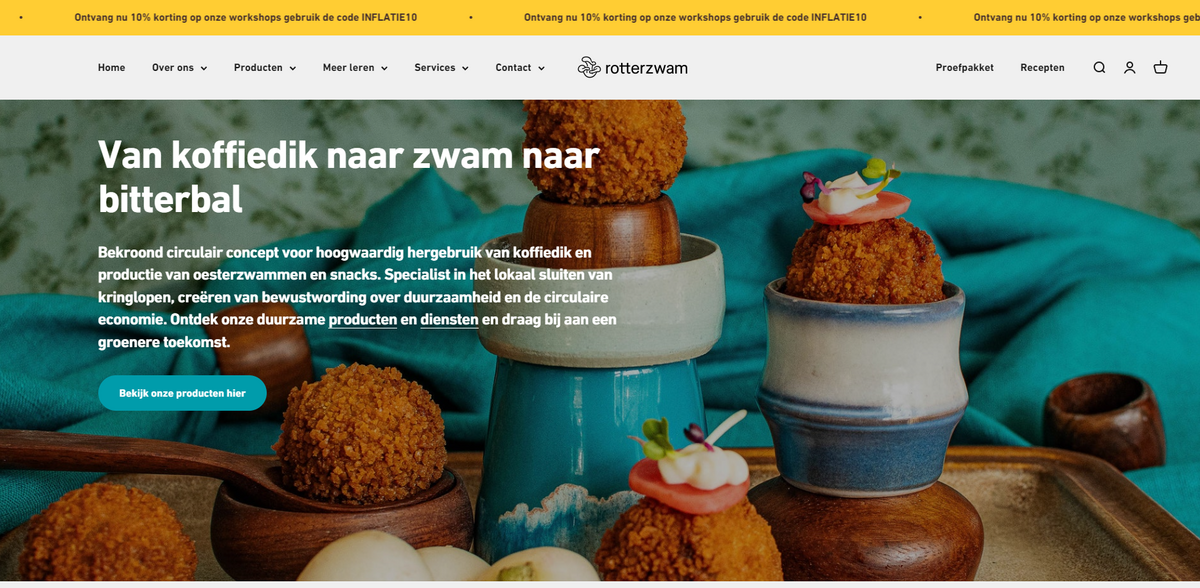What the Project Is
ROTTERZWAM is an award-winning circular concept focused on high-quality reuse of coffee grounds and the production of oyster mushrooms and snacks. With a strong commitment to locally closing loops, this innovative project transforms what would otherwise be waste into valuable resources. Operating within the growing non-perennial crops industry and backed by a B-Corp score of 105, ROTTERZWAM offers a sustainable solution that not only saves coffee grounds from incineration but also promotes plant based protein consumption for vegan and vegetarian lifestyles. It’s all about creating a greener future, one coffee ground at a time…
Main Benefit
The benefits of ROTTERZWAM’s innovative approach are clearly visible in its key results and facts. Among these are:
- 379,299 KG of coffee grounds saved
- 22,626 KG of oyster mushrooms grown
- 134,488 KG of CO2 emissions avoided
- Sustainable gift package options that reflect a commitment to eco-friendly practices
- High-quality mushroom products produced in urban settings
Our Mission and History
The heart of ROTTERZWAM lies in its mission: to foster a society that prioritizes closing loops, maximizing resource use, and leaning more on plant based protein rather than animal products. The project believes in enhancing local, regional, and international networks to stimulate mushroom production using locally sourced waste streams. Its journey began in 2013 in the old Tropicana Swimming Pool—now known as BlueCity—along the Maas in Rotterdam. Since then, despite facing challenges and learning many lessons along the way, ROTTERZWAM has steadily expanded its cultivation facilities and operations across multiple cities. Every step of this journey is marked by a commitment to authenticity and a desire to produce sustainable outcomes.
Transparency in Action
In today’s world, many claim to give coffee grounds a noble new use and to grow mushrooms on them. However, ROTTERZWAM sets itself apart by ensuring complete transparency. The project doesn’t just talk about lofty goals—it shows what it really does by sharing verifiable data. There’s a refreshing honesty in disclosing concrete figures, processes, and outcomes. This transparent approach helps businesses and communities make informed choices about sourcing products and partnering with them, ensuring the journey towards sustainability is as clear as the recycled water used in their facilities.
Sustainable Shipping Packaging
Beyond the innovative use of coffee grounds and mushroom production, ROTTERZWAM also champions the concept of reusable shipping packaging. Instead of the single-use culture that leads to excess waste, these shipping packages are designed to be returned and reused multiple times. This simple yet impactful improvement results in less waste at home and can reduce environmental impact by up to 10 times compared to disposable alternatives. It’s a small change that speaks volumes about the commitment to responsible consumption and production practices—an important part of the broader sustainability puzzle.
Project Impact
- SDG 12: Responsible Consumption and Production – by creating innovative ways to reuse waste materials and save coffee grounds from incineration.
- SDG 13: Climate Action – through measurable CO2 emissions avoided by the project’s circular practices.
- SDG 2: Zero Hunger – by contributing to more mushroom production and offering plant based protein options.
- SDG 11: Sustainable Cities and Communities – with a focus on urban mushroom farming and sustainable shipping solutions.
Urban Mushroom Farm and Beyond
ROTTERZWAM is not just about mushroom production—it’s a vibrant hub for sustainability-driven activities. In urban areas, the concept of an Urban Mushroom Farm is expanded through engaging Mushroom Workshops and Trainings that offer hands-on experiences for companies and teams looking for a unique, eco-conscious activity. These events underscore the project’s role in popularizing an approach that includes saving coffee grounds from incineration and promoting plant based protein sources for vegan and vegetarian lifestyles. Participants discover the comprehensive process behind turning everyday waste into an honest snack or high-quality mushroom product, all while contributing to carbon credits and reducing their environmental footprint. The natural, conversational style of these workshops makes them both engaging and educational… truly demonstrating that sustainable practices and community involvement are not mutually exclusive.





















